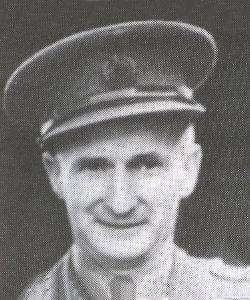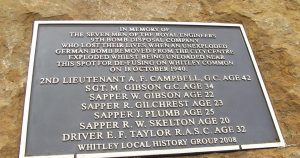On 17 October 1940, Second Lieutenant Sandy Campbell and his team of the Royal Engineers Bomb Disposal Company were called upon to deal with an unusually large and unexploded bomb that had fallen at the Triumph Engineering Company’s works in Canley.
War production in the two factories had ceased on a temporary basis because of this bomb and a large number of people living nearby were evacuated from their homes.

After two days of digging the UXB was unearthed, 2/Lt. Campbell found that the bomb was fitted with a delayed action fuse that was impossible to remove, so he decided to transport it to a safe place.
That was done by lorry… and Sandy Campbell lay alongside the bomb so that he could hear if it started ticking and could warn the driver to stop and run for cover.
Having taken it to a safe distance, he disposed of the bomb successfully – for this action, 2/Lt Sandy Campbell was awarded the George Cross.
The very next day, 2/Lt Sandy Campbell (aged 42) and his team were killed attempting a similar disposal at Whitley Common and his George Cross was awarded by the King posthumously to his widow for his work at the Triumph the day before, Agnes Sharp Campbell of Dalmellington, Ayrshire. Both he and his team are buried at London Road Cemetery.

New info: Alexander “Sandy” Fraser Campbell (1898-1940) was born on 2nd May 1898 in Dalmellington, Ayrshire, Scotland, the son of Archibald and Mary Campbell (nee Fraser). It seems that he was brought up by the Smith family, who lived in Dalmellington, from primary school age, as both his parents had passed away. Following schooling, he trained as an Electrical Engineer at Dunaskin, Waterside, 3 miles from Dalmellington. He also served in World War I with the Army Service Corps from August 1915 to 1917. He was later attached to the 14th Battalion, Welsh Regiment then the Drake Battalion, Royal Naval Division and the 10th Battalion, King’s Shropshire Light Infantry. At the end of the war, he returned to his previous occupation.
In 1938, he had a job in Rothesay, Isle of Bute, and in June that year, he married Agnes Hill, a school teacher from Dalmellington. They set up home on the Isle of Bute. Shortly afterwards, the Second World War broke out and Alexander was commissioned as a 2nd Lieutenant on 2nd July 1940 in Corps of Royal Engineers, becoming part of 9 Bomb Disposal Company.

